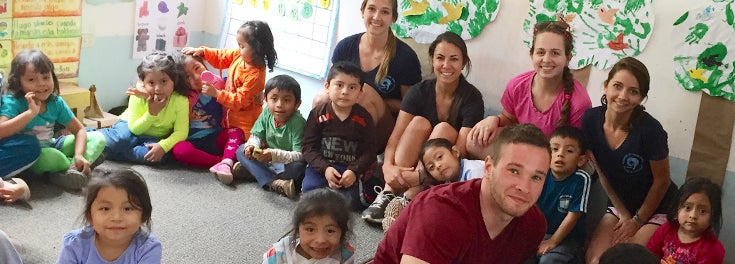Life can be tough for disabled people in Guatemala. Children, often hidden from public view, do not attend school. Adults have trouble finding jobs, and buildings and roads are inaccessible to the few who can get wheelchairs. URI physical therapy students took their skills and compassion to the Central American country over spring break, and returned with a better understanding of poverty’s impact on health services.
“We were all expecting to go there and teach people, but I really think they taught us more,’’ says Jessica Arouchon. “They have so little, and end the day smiling. It was a fantastic trip. I already want to go back.’’
Jennifer Audette, assistant professor of physical therapy, created the program a decade ago as a way to expose her students to a different culture. During the two-week trip, students volunteered at Centro Maya Servicio Integral, a nonprofit that helps children and teenagers with physical and cognitive challenges. They also toured hospitals and preschools, and visited families in their homes, modest cinderblock structures with outside kitchens, dirt floors, and no indoor plumbing.
Students are getting valuable clinical experience—and seeing the challenges patients face in another part of the world. What could be more important than that?
“The students were awesome,’’ says Audette. “They were very independent and responsible and jumped in to do whatever was asked of them.’’ What’s more, they learned how to be creative with limited resources. Centro Maya has only one physical therapist and equipment is scarce. The students used books instead of hand weights and teamed up with family members to help clients walk since there were no parallel bars.
Many of the children have spina bifida, cerebral palsy, or developmental limitations caused by malnutrition that plagues about half of the children in Guatemala. Chad Pare was moved by the children’s resilience. Some patients, he says, walked miles from the mountains for their weekly treatment at the Center. “We take a lot for granted in the United States,’’ says Pare. “They were so grateful for everything.’’
And that includes a new room for counseling services built at the Center by students under the guidance of stonemason Eric Dunham, a friend of Audette’s. Before departing, the students left their mark in the wet cement: “URI DPT 2016,’’ referring to their degree and graduation year. “Everyone was so appreciative of our work in the clinic and community,’’ says Laura Thompson. “We built something for them that will last a lifetime, and that’s so rewarding.’’
The students paid their own way and received two credits for a “Broadening Experiences’’ class. Many of the students in the program have undergraduate degrees in kinesiology or exercise science, and all are working on their doctorates in physical therapy, a three-year graduate program.
For Audette, Guatemala has become a treasured destination. She and her husband go there often with their three children. “I’m so proud of our URI program,’’ she says. “Students are getting valuable clinical experience—and seeing the challenges patients face in another part of the world. What could be more important than that?’’

